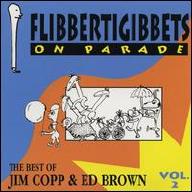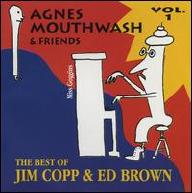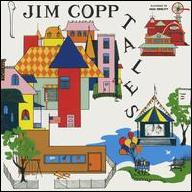Born on 1913 in Los Angeles, Copp was raised in that town, as well as in Alabama and Washington D.C. Copp graduated from Stanford and then did two years of graduate work in English at Harvard. Copp set off for New York to start a career as a cabaret piano comic, using the name James Copp III. He was quite a success, sharing the stage with Teddy Wilson, Lena Horne, Art Tatum, and Billie Holiday. When World War II came, Copp commanded an intelligence unit in Germany. After the war, he again worked in New York, and then returned to Los Angeles. For several years, Copp wrote and illustrated a society column for the Los Angeles Times.
Copp met Ed Brown in Los Angeles, and the two began a lifelong friendship. Copp had an idea for a children's album, one that would incorporate his own numerous musical talents with Brown's genius for design. He experimented at home with a tape recorder, trying out various effects with his voice. Copp brought a demo tape to Sonny Burke at Capitol Records. Capitol was interested, but wanted a "name" star such as Jerry Lewis to do the voice.
So Copp and Brown decided to release their own children's record. As it turned out, they put together a whole series of recordings -- about one a year. Copp and Brown developed a routine for the labor-intensive productions. Typically, Copp would sit at a desk or table, writing the songs and stories. Meanwhile, at his own house, Ed Brown would work on the design of the album, creating a gimmick, such as a board game or "moving pictures," which would help the records sell.
Copp and Brown would record all of the sound effects, speeches, songs, and stories in pieces. Perfectionists to a fault, Copp and Brown would often do multiple takes until they were satisfied. Copp's house hosted his own six-piece orchestra: the piano was taped in the living room, the pump-organ in the bathroom, and the celeste in a bedroom. The entire recording was done with one microphone and three Ampex tape recorders. Copp devised his own overdubbing technique by ping-ponging between the mono machines to build up layers of sound. Copp, a master voice artist, could birth a whole classroom of different voices in this manner.
This unusual technique was matched by the unusual content of the albums. At a time when children's media was dominated by Disney and Captain Kangaroo, Copp and Brown offered up a despotic fourth grade teacher (Miss Goggins, ) a starved and abandoned child (Little Claude), and a talking pancake. The engaging recordings never talked down to kids, and never moralized. Many of the stories were told in rhyme, but the result was anything but boring: the cadence and the vocabulary swept you away.
Copp and Brown released the first recording, Jim Copp Tales, in 1958 on their own Playhouse label. Copp used his nickname instead of his cabaret name, in case the project fell flat. Jim Copp Tales featured the first appearance by Miss Goggins, and a story of a cow and kitty cat who buy a house. The animals go around and try out the appliances, but decide that the best way to try out the doorbell is to wait for it to ring. Jim Copp Tales was given a lot of exposure on radio and TV, causing the I Magnin chain of department stores to bid for exclusive West Coast distribution. Encouraged and armed with a list of merchandising contacts, Copp and Brown criss-crossed the country with the records in their baggage.
Fable Forest followed in the next year, reworking old fables in a way that Aesop would never imagine. The album was selected as a "Spotlight" record of the week in Billboard Magazine. Thimble Corner followed. Perhaps one of the most successful albums, it featured a horrendous tale of Miss Goggins and a talent show. One of the stories on Thimble Corner, about a life-saving duck, was later borrowed by Barry Louis Polisar in The Carpenter and the Chicken. The next album, A Fidgety Frolic, had dollies that flew to the moon and a very pompous empty bottle.
The following album A Journey to San Francisco with the Glups introduced a family that would recur in later Playhouse albums. The bumbling Glups, with Feeble Phoebe and Bossie Cow, encounter multiple calamities on their cross-country car trip. Gumdrop Follies reworked some of the most popular Copp/Brown tales. Schoolmates, the eighth album, featured a "magic picture show" designed by Brown, with cards to change a scene in Miss Goggins' classroom. The album also tread on new thematic territory with some very pointed comments about the people one encounters in the classroom.
The last Copp and Brown album, The Sea of Glup, sent the unfortunate family on a voyage on an ocean liner. Again, the Glups encounter several interesting characters -- and lose body parts as well.
Unfortunately, Copp and Brown closed up the Playhouse Records shop in 1971. Ed Brown fell ill with pancreatic cancer and died in 1978. It wasn't until Copp was contacted in the early '90s by a videographer, Ted Leyhe, that he considered re-releasing the albums. Leyhe was a fan as a child, and was delighted to find Jim Copp in Los Angeles.
Leyhe and Copp repackaged each of the albums on cassette. They also issued two best-of albums on CD, Agnes Mouthwash and Friends and The Flibbertigibbets on Parade. The CDs featured many of the most popular Copp and Brown songs and skits, as well as some previously unreleased material, such as "The Bridge Game" and "The Itch." Henry Kaiser was a featured writer of the liner notes. Leyhe also produced a documentary video of Jim Copp's life, Skylarking: The Life and Times of Jim Copp. ~ P.J. Swift, Rovi














